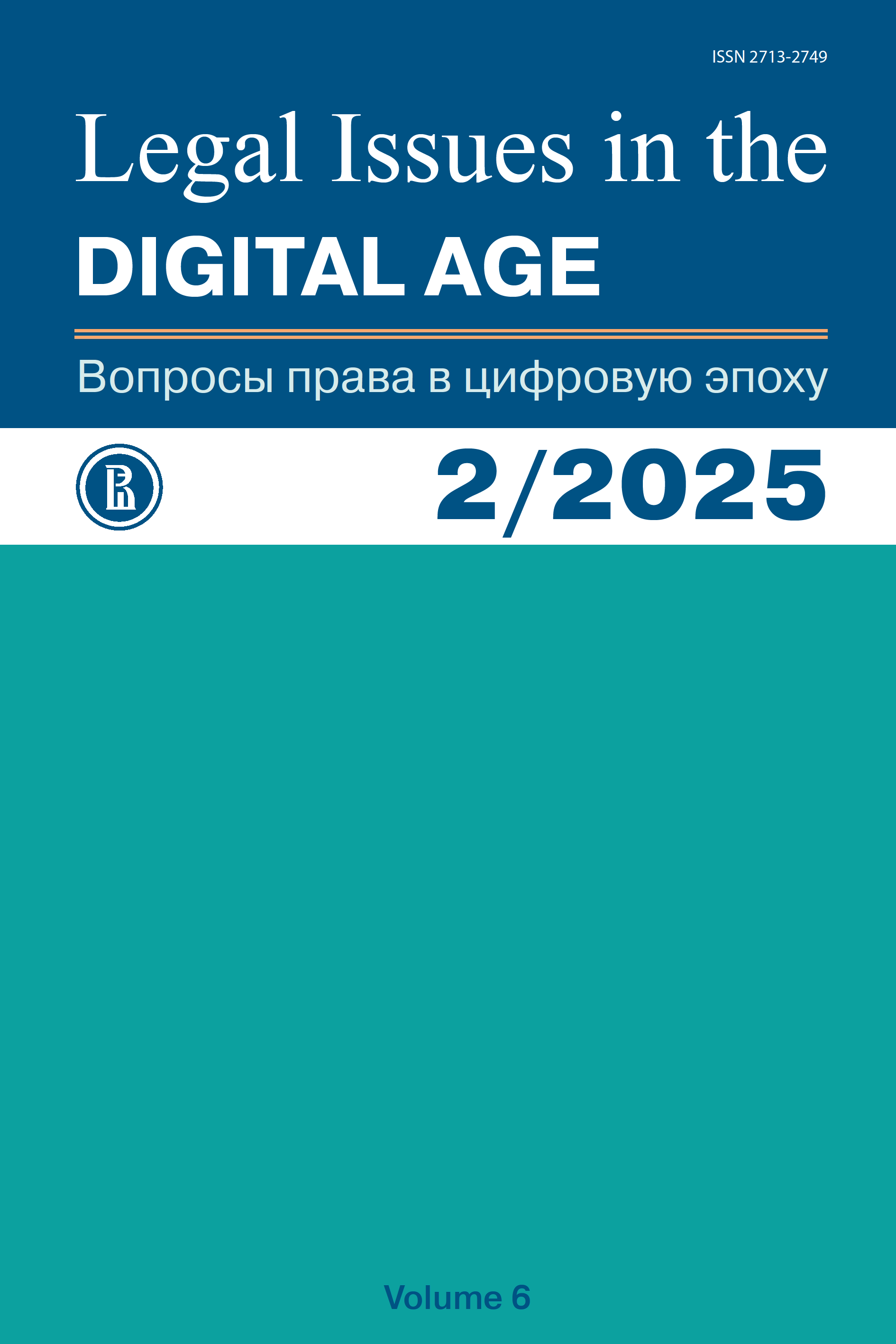Smart Digital Facial Recognition Systems in the Context of Individual Rights and Freedoms
Аннотация
The authors discuss the problem of digital facial recognition technologies in the context of implementation of individual rights and freedoms. The analysis is focused on whether their use is legitimate and on interpretation of the provisions behind the underlying procedures. The authors note a significant range of goals to be addressed through the use of smart digital systems already at the goal-setting stage: economy, business, robotics, geological research, biophysics, mathematics, biophysics, avionics, security systems, health, etc. Higher amounts of data and a broader range of technologically complex decision-making objectives require to systematize the traditional methods and to develop new decision-making methodologies and algorithms. Progress of machine learning and neural networks will transform today’s digital technologies into self-sustained and self-learning systems intellectually superior to human mind. Video surveillance coupled with smart facial recognition technologies serves above all public security purposes and can considerably impact modern society. The article is devoted to the theme of legitimate use of digital facial recognition technologies and to the interpretation of provisions laying down the underlying procedures. The authors’ research interests assume an analysis of legal approaches to uphold human rights as digital facial recognition systems are increasingly introduced into social practices in Russia, European Union, United Kingdom, United States, China. The purpose of article is to shed light on regulatory details around the use of AI systems for remote biometric identification of persons in the process of statutory regulation. Methods: formal logic, comparison, analysis, synthesis, correlation, generalization. Conclusions: the analysis confirms that facial recognition technologies are progressing considerably faster than their legal regulation. Deployment of such technologies make possible ongoing surveillance, a form of collecting information on private life of persons. It is noted that accounting for these factors requires amending the national law in order to define the status and the rules of procedure for such data, as well as the ways to inform natural persons that information associated with them is being processed.
Литература
Andreeva I.O. (2019) Face Recognition Technologies in Criminal Proceedings: Issue of Legal Basis behind the use of Artificial Intelligence. Vestnik Tomskogo gosudarstvennogo universiteta=Bulletin of the Tomsk State University, no. 11, p. 12 (in Russ.)
Artemova S.T., Zhiltsov N.A. et al. (2020) Digital Divide and Constitutional Guarantees of Digital Equality. Konstitutsionnoe i munitsipalnoye pravo=Constitutional and Municipal Law, no. 10, pp. 41–45 (in Russ.)
Bobrinskiy N.A. (2021) Moscow’s Punitive Innovation: Tentative Results. Zakon=Law, no. 6, pp. 89–95 (in Russ.)
Gordon B. (2021) Automated Facial Recognition in Law Enforcement: The Queen (On Application of Edward Bridges) v. The Chief Constable of South Wales Police. Potchefstroom Electronic Law Journal, no. 24, pp. 1–29.
Grigoriev V.N. (2021) Information Technologies in Riot Investigation. Vestnik Sankt-Peterburgskogo gosudarstvennogo universiteta. Pravo=Bulletin of Sankt Petersburg University. Law, no. 2, pp. 334–355 (in Russ.)
Huang J. (2020) Applicable Law to Transnational Personal Data: Trends and Dynamics. German Law Journal, vol. 21, no. 6. pp. 1283–1308.
Kartashov A.S. (2022) Realization of Constitutional Rights and Freedoms in ‘Smart Cities’: Main Risks and Ways to Minimize it. In: Constitutional Reform and Legal Development of Ethnic Groups in Russia. Kazan: Buk, pp. 104–111 (in Russ.)
Khabrieva T. Ya. (2018) The Law in the Digitalization Conditions. Zhurnal rossiyskogo prava=Journal of the Russian Law, no. 1, pp. 85–102 (in Russ.)
Kharitonova Y.S., Savina V.S., Pagnini F. (2021) AI Algorithmic Bias: Ethics and Law. Vestnik Permskogo gosudarstvennogo Universiteta. Jurisprudencia=Bulletin of the Perm State University. Jurisprudence, no. 3, pp. 488–515 (in Russ.)
Kitchin R., Dodge M. (2021) (Un) security of Smart Cities: Risks, Mitigation and Prevention of Negative Consequences. In: City Networks: People. Technologies. Authorities. E. Lapina-Kratasyuk et al. (eds.). Moscow: Novoe Literaturnoe obozrenie, pp. 105–130 (in Russ.)
Kostka G., Steinacker L., Meckel M. (2021) Between Security and Convenience: Facial Recognition Technology in the Eyes of Citizens in China, Germany, the United Kingdom, and the United States. Public Understanding of Science. no. 30, pp. 671–690.
Maslovskaya T.S. (2019) Digital Sphere and Constitutional Law: Facets of Interaction. Konstitutsionnoye i munitsipalnoye pravo=Constitutional and Municipal Law, no. 9, pp. 18–22 (in Russ.)
Pashentsev D.A. et al. (2019) Digitizing Law-Making: Search for New Solutions. Moscow: Infotropic, p. 20 (in Russ.)
Rassolov I.M., Chubukova S.G. et al. (2020) Biometrics in the Context of Personal Data and Genetic Information: a Legal Dimension. Russkiy zakon=Lex Russica, no. 1, pp. 108–118 (in Russ.)
Talapina E.V. (2021) Surveillance (Spying) and Human Rights: New Risks in the Digital Age. Sravnitelnoye konstitutsionnoe obozrenie=Comparative Constitutional Review, no. 6, pp. 123–136 (in Russ.)
Zharova A.K. (2019) Regulating Information Security in the ‘Smart Cities’. Yurist=Lawyer, no. 12, pp. 69–76 (in Russ.)
Zorkin V.D. (2021) Under the Sign of the Fundamental Law. Constitutional Court at the Turn of the Fourth Decade. Rossiyskaya Gazeta=Gazette of Russia. 27 October, no. 247 (in Russ.)
Copyright (c) 2025 Stepanov O.A., Basangov D.A.

Это произведение доступно по лицензии Creative Commons «Attribution-ShareAlike» («Атрибуция — На тех же условиях») 4.0 Всемирная.
Авторы, присылающие рукописи для рассмотрения к публикации в Журнале, принимают Политику лицензирования, авторских прав, открытого доступа и использования репозиториев.







